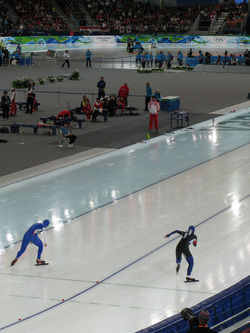
Simply put, we Americans waste too much time on our football, at which we are the best because no one else in the world plays the game, he said.
Oh yes, and we Americans think we ought to expect to win everything because … well, that’s just how we are.
Anema seems to be having a jolly, humorous time with his interviewers while giving American cable TV the outrageous and combative tone it craves. The Dutch people I’ve met have wonderful senses of humor, and he seems to know how to play his audience well while never losing his smile.
| | (As an example of how screwy the interview gets, Utah readers should make particular note of the shout-out he gives the Utah Jazz as one of his favorite NBA teams). Having covered long-track speed skating leading up to and during the 2002 Winter Olympics in Salt Lake City, and having spent several years of my life in Europe, I can lend some perspective to all this. First, from the European perspective, many average Americans do come across as brash, overbearing and more than just a little culturally condescending. It’s natural to want to stick it to people like that. Anema probably couldn’t resist, even if he couched it in humor, and who could blame him? Second, in all my years of covering sporting events (despite writing mostly about serious news these days, I do have a wide and diverse sports resume), I have never encountered people as loyal, energetic and fanatic as Dutch speed skating fans. To give just one example, I once covered a World Cup race in Kearns, Utah. If I didn’t know that I could get a hamburger and fries at the Arctic Circle a few blocks away, I would have thought I was in Amsterdam. The building was packed with Dutch people who had flown in for the event, and they were loud. Afterward, at the post-race press conference, the folks in charge decided there would be a limited few questions allowed in English, then the rest would be conducted all in Dutch. In Kearns, Utah, for heaven’s sake. Of course, I could have gone door to door in the neighborhood around the oval and had difficulty finding someone who would take a free ticket to the event, or who even knew it was being held. They were all probably watching American football on TV. Anema is right that the U.S. doesn’t spend a lot on speed skating. The athletes I covered had to work all day at Home Depot, a sponsoring company, in order to afford to train. I followed them as they competed in obscurity in remote places, such as Butte, Montana, hoping for a chance at Olympic glory some day. The only folks in the little-league-style bleachers in Butte were a few parents of skaters who had made the trip. Anema is wrong about the success of American speed skaters, of course. This year was an anomaly. Yes, Holland rules, particularly in the really long distances. But the United States has had its fair share of medals through the years. Derek Parra and Chris Witty stand out from the 2002 Games. Seeing how hard they had to work in obscurity to obtain their prize made it all even more thrilling. The CNBC interview is a great example of how to exploit a failure to communicate. Anema and average Americans represent two different cultures; two different views of the world. Most Americans don’t find a 10K speed skating race interesting. The Dutch do. They really, really do. They love it so much they become Utah Jazz fans because they’re always flying to Salt Lake City to watch their racers compete in a facility built for the Olympics. So, good for them. And good for CNBC for providing a thoroughly entertaining interview. |

 RSS Feed
RSS Feed

